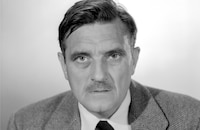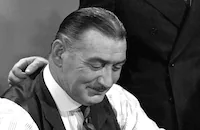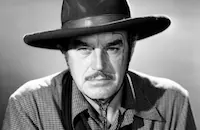Desire Me

Brief Synopsis
Cast & Crew
George Cukor
Greer Garson
Robert Mitchum
Richard Hart
Morris Ankrum
George Zucco
Film Details
Technical Specs

Synopsis
In the Paris office of psychiatrist Andre Leclair, Marise Aubert discusses her failing marriage to Paul Aubert, a war veteran with whom she once was deeply in love. Marise relates the story of how she lost her love for Paul, beginning her tale at the time of his internment in a Nazi prisoner of war camp: At the camp, Paul meets fellow prisoner Jean Renaud, who listens to Paul's endless stories about the loving wife who awaits him at their seaside cottage in the Normandy fishing village of Kergat. One day, Paul is shot by Nazi guards while he and Jean attempt to escape from the camp. Shortly thereafter, Jean, believing Paul to be dead, travels to Kergat to meet the woman Paul praised so highly. When Jean enters Paul and Marise's cottage and plays the couple's favorite song on the piano, Marise, hearing the tune from a distance, believes that Paul has finally returned. She is shocked, however, when she discovers that the man playing is a stranger. Marise is further astonished when she realizes that Jean knows every detail about her personal life. Jean tells Marise that her husband died during the escape attempt, but he does not tell her that he left Paul to die on the outskirts of the camp. Jean, who has fallen in love with Marise based on Paul's stories about her, makes romantic advances toward her, but she rejects him. Marise asks Jean to leave, but a fierce rainstorm prevents his departure, and the following day he apologizes for his brusque manner. As the days pass, Marise begins to trust Jean, and invites him to stay in her home indefinitely. Jean and Marise's friendship soon turns to love, but Jean's hope for a happy future with Marise appears dashed when he finds a letter addressed to Marise from Paul, who is still alive. In the letter, which Jean hides from Marise, Paul writes that he is recuperating from his gunshot wounds at a military hospital and that he plans to return home in a short time. Desperate to continue his romance with Marise, Jean makes plans to flee Kergat with her before Paul arrives. Marise initially refuses to join Jean in Paris, but he eventually prevails and they make preparations to leave Kergat at once. While Marise meets with Father Donnard to discuss her future with Jean, Paul returns to Kergat and walks through the streets of the town. Hector, who has just bought Paul's business from Marise, is shocked to see Paul alive, and races to Father Donnard's to tell Marise the news. Marise, nearly overcome with joy, runs back to her cottage. Jean, meanwhile, goes to Father Donnard's to pick up Marise, and learns that Paul has returned to Kergat. Determined to keep Paul and Marise from reuniting, Jean runs to Paul's boathouse, grabs a gun and races to the cottage. Marise finds Paul before Jean does, and they embrace and kiss. However, their happy reunion is quickly tempered by Marise's confession that she has been involved romantically with Jean. Paul is upset at the news but promises Marise that he will show compassion toward his comrade if Jean can convince him that he did not attempt to deceive Marise. Jean and Paul find each other on a fog-shrouded cliff, where Jean fires a number of shots at Paul. He misses each time and soon runs out of bullets, however. Paul then pulls out his knife and approaches Jean, and the two men engage in a hand-to-hand battle at the cliff's edge. Marise, who has heard the gunshots, arrives at the cliff's edge just as Jean loses his footing and falls to his death. After coming out of her reverie and concluding her story for the doctor, Marise tells Dr. Leclair that since that tragedy, her feelings of guilt have prevented her from being a good wife to Paul. Acting on Dr. Leclair's advice, Marise decides to stop dwelling on the sorrows of her past and returns to Paul to start a new life with him.

Cast

Greer Garson

Robert Mitchum

Richard Hart

Morris Ankrum

George Zucco
Cecil Humphreys
David Hoffman
Tony Carson
Mitchell Lewis
Jean Del Val
Fernanda Eilscu
Sid D'albrook
David Leonard

Edward Keane
Belle Mitchell
John Maxwell
Lew Mason
Nick Kobliansky
Brian Burke
Jackie Wanger
Max Cutler
Jose Portugal
Hans Tanzler
Maurice Tauzin
Stanley Andrews

Harry Woods
Vangie Beilby
Rose Plumer

William Mccormick
Sam Ash
Earle Hodgins
Bert Lebaron
Tom Plank
Gil Perkins
Albert Petit
Pietro Sosso
Grace Lord
Duke Johnson
Jack Shafton
Iris Shafton
Vincent Sollecito
Josephine Victor
Crew
Zoë Akins
Frederic Brunn
Jack Dawn
Joseph Dervin
Cedric Gibbons
A. Arnold Gillespie
Jack Greenwood
Sydney Guilaroff
Arthur Hornblow Jr.
Harry Horner
Paul Huldschinsky
Irene
Urie Mccleary
Warren Newcombe
Marguerite Roberts
Casey Robinson
Joseph Ruttenberg
Victor Saville
Hans Schumm
Douglas Shearer
Valles
Edwin B. Willis
William Yetter

Videos
Movie Clip



Trailer
Film Details
Technical Specs

Articles
Desire Me
With a team that included legendary director George Cukor and veteran producer Arthur Hornblow, who had a megahit with Gaslight in 1944, MGM's top leading lady, Greer Garson and headline-grabbing bad-boy actor Robert Mitchum, along with screenwriter Casey Robinson, Desire Me should have been a sure-fire hit. Instead, it was a nightmare for all concerned.
The trouble started even before production began in March of 1946. The Breen Office, the official censor of Hollywood films, made numerous complaints about what they deemed, "a story of illicit sex and adultery, treated without the full compensating moral values required by the [Production] Code. In fact, it amounts practically to a condonation of adultery." Many script changes had to be made to appease the bluenoses, yet they wreaked havoc upon the storyline.
Hornblow had originally wanted Walter Pidgeon to play Paul, as he and Garson had such a big hit with Mrs. Miniver (1942), but that was nixed when the filmmakers realized how strongly those actors had been associated with their noble roles. The thought of public reaction to Garson being unfaithful to Pidgeon in a film was enough to make them change their minds and Robert Montgomery, who had been with MGM for decades, was chosen to play Paul. Robert Mitchum, under contract to David Selznick, was given the role of Paul's POW buddy, Jean. Shooting began on March 19, 1946 and was halted after only a week. Cukor hated Mitchum and the script so badly, he shut down production and hired three new writers, Zoë Akins, Sonya Levien and Marguerite Roberts to do emergency rewrites. The delays did not result in a better script, but did result in Robert Montgomery having to leave the picture due to contractual obligations to start acting and directing Lady in the Lake (1947). Mitchum was then ordered to play Paul and Richard Hart, only making his second film appearance, played Jean.
The change of roles angered an already unhappy Mitchum, who believed, correctly, that Hart's part was more interesting. He also despised having to work overtime for Cukor, and took no pains to conceal it, as he was exhausted from filming two movies at once. "I was working on a picture with Laraine Day, and we were working nights out on the 40 acres. I'd finish at dawn, go into makeup at Metro at 7 A.M. and at noon, they shipped me to Monterey and I worked all afternoon with Greer Garson. I worked something like 21 days and nights. Never got a chance to sleep. Completely lost my mind." Garson literally suffered the most. First, she had to endure Mitchum's post-lunch breath, which he later described as being so bad, "Her eyes would spin around and she'd offer me a Chiclet. I'd refuse. Gum? No thanks. It didn't occur to me my breath was spinning her out." Then, Mitchum began to play pranks, like stealing props and wigs and writing the word "Red" (referring to her hair) on the stage floor where Garson's camera marks had been. The worst came when Garson nearly drowned when the company moved three hundred miles north to Victorine Ranch in Monterey, California.
On April 19th, Garson and Richard Hart were working on a sequence that required her to step onto a beach and take up a shrimp net. As she did so, an eight-foot wave crashed down on the two actors before anyone could reach them. Garson and Hart were swept out to sea thirty feet and tossed against the rocks. Plagued with a heart condition that eventually killed him at the age of 35 in 1951, Richard Hart couldn't get Garson, so a local fisherman, Vincent Sollecito, who was acting as an advisor, jumped in and saved her. Garson was found to have injured her back and was badly cut. Those injuries left her shaken and deeply depressed, barely able to work and requiring surgery. It would be several years before she was completely healed. MGM thanked Sollecito with a $1000 check and Garson likewise presented him with a handsome gift. Greer Garson's condition nearly stopped production, which moved along at a crawl.
With the budget now an out of control $4 million and a cast and crew well aware that they were making a flop, producer Arthur Hornblow fired George Cukor and, in desperation, replaced him with a series of top directors like Victor Fleming, then Jack Conway, Victor Saville and finally, Mervyn LeRoy. Although they had an impressive track record in Hollywood, none of these directors, not even LeRoy could make it work by the time filming ended on August 1st. LeRoy later admitted "They had a good cast, but a rotten script, a script that made absolutely no sense. I tried my best to make something out of it, but I failed, just as Cukor had failed."
The finished product was a disaster and Hornblow called for emergency meetings with studio brass to try to find a solution, short of throwing more money at Desire Me or throwing it in the garbage can. The agreement was that the film was held back for just over a year and George Cukor got the official blame. However, Cukor's friend Elliott Morgan believed that the problem stemmed from Cukor's inability to get along with Mitchum.
It was said that the total failure of Desire Me marked the beginning of the end for MGM studio chief Louis B. Mayer, who had ruled the production end of the company for three decades. Nicholas Schenck, chairman of MGM's parent company, Loew's Inc., began to groom producer Dore Schary as Mayer's successor. Desire Me did win one honor, however dubious. Life wrote in its March 8, 1948 edition that the film "beat out heavy competition to become 1947's most undesirable picture. It dealt with a morose love affair which made a bigamist out of Greer Garson. Two top-tier directors (George Cukor and Mervyn LeRoy) worked on Desire Me but the final result was so bad that neither one would permit his name to be put on it."
Producer: Arthur Hornblow, Jr.
Director: George Cukor
Screenplay: Casey Robinson, Marguerite Roberts, based on the play Karl and Anna by Zoe Akins and Leonhard Frank
Cinematography: Joseph Ruttenberg
Film Editing: Joseph Dervin
Art Direction: Cedric Gibbons, Urie McCleary
Music: Herbert Stothart
Cast: Greer Garson (Marise Aubert), Robert Mitchum (Paul Aubert), Richard Hart (Jean Renaud), Morris Ankrum (Hector Martin), George Zucco (Father Donnard), Cecil Humphreys (Dr. Leclair).
BW-92m. Closed captioning.
by Lorraine LoBianco
SOURCES:
Eyman, Scott Lion of Hollywood: The Life and Legend of Louis B. Mayer
The Internet Movie Database
Life 8 March 48
Roberts, Jerry Mitchum: In His Own Words
Troyan, Michael A Rose for Mrs. Miniver: The Life of Greer Garson

Desire Me
Quotes
Trivia
It took Greer Garson 125 takes to enunciate the word "No" to the director's satisfaction. Co-star Robert Mitchum claimed later that this incident was when he first stopped taking Hollywood seriously.
During one scene, a huge wave swept Garson and co-star Richard Hart along the jagged rocks of the Monterey coast, inflicting bruises, cuts and back problems on Garson that would require many surgeries and hospital visits in the following months and years.
Notes
Working titles for this film were A Woman of My Own, Great Temptation, The Intruder, Sacred and Profane, Beloved Stranger, As You Desire Me and Carl and Anna. The film had no director's credit, and is often cited in modern sources as the first major Hollywood film to be released without one. According to Hollywood Reporter news items and production charts, George Cukor was the film's first director. The Variety review notes that Cukor directed most of the film, and that Mervyn LeRoy "finished it." On June 5, 1946, according to Hollywood Reporter, Cukor collapsed on the set and was rushed home to recover from the flu. Director Victor Saville substituted for Cukor until June 27, 1946, when Cukor resumed direction. Modern sources indicate that Jack Conway directed portions of the film, but a Robert Mitchum biography quotes the actor as having no recollection of the director working on the film. Contemporary news items quote the following about early production: In early April 1946 actor Robert Montgomery walked off the production after three weeks of work because of a "difference of opinion" he had with Cukor over the interpretation of the role. Montgomery was replaced by Richard Hart, a stage actor who made his screen debut in the film.
Drafts in the M-G-M script collection at USC's Cinema-Television Library indicate that Sonya Levien and Zoë Akins reworked Casey Robinson's original adaptation into the screenplay used for initial production from March through August 1946. MPAA/PCA files at the AMPAS Library note a certificate was issued for a completed film in September 1946. Contemporary news items indicate additional retakes with Garson and Mitchum were scheduled to follow Mitchum's completion of his work on the Warner Bros. film Pursued (see below), which ended in late October 1946. A modern source quotes Mervyn LeRoy as saying that a December 1946 test preview of the film were "disastrous." According to his biography, Mitchum and many attendees of the December 1946 preview left the theatre after watching the first reel. The M-G-M script collection indicates Marguerite Roberts began working on rewrites in early 1947 and reshooting commenced shortly thereafter. PCA files indicate reshooting continued through July 1947. A PCA memo, dated July 29, 1947, from Geoffrey Shurlock notes "Since our review of this picture on September 9, 1946...the studio has remade eighty percent of it." Levien never received credit for her contribution and modern sources indicate Roberts tried to have her name removed from the released film. Cukor, as quoted in a modern source, stated that the "script didn't really make sense, and when it was finished I was just removed from the picture, and another director reshot a good deal of it with the understanding that his name wouldn't appear on the credits. Since very little of the final footage is mine, I wouldn't allow my name to be on the picture either."
The CBCS lists actors Florence Bates, Max Willenz and Clinton Sundberg in principal roles, but these characters were dropped in the Roberts rewrite and did not appear in the final film. Various contemporary news items note the following additional information about the production: The film's French fishing village set was constructed on the M-G-M lot, and included thirty-five buildings and a 200 square foot harbor with twelve fishing boats. In addition to the backlot set, M-G-M built a duplicate fishing village near Monterey, CA. Two hundred soldiers from Fort Ord, near Monterey, were used in the film. According to an article in Los Angeles Times, while filming in Carmel, CA, actress Greer Garson nearly drowned in the ocean and was rescued by a fishing skipper named Vincent Sollecito. M-G-M rewarded Sollecito for his heroic act by casting him in a bit role.
A stage adaption of Frank's novel, entitled Karl and Anna, opened at the Guild Theater in New York on October 7, 1929. The play was directed by Philip Mueller and starred Otto Kruger, Alice Brady and Claude Rains. Other films based on Leonhard Frank's novel are the 1928 German film Heimkehr, directed by Joe May and starring Lars Hanson and Dita Parlo, and a 1941 German film also entitled Heimkehr.

















